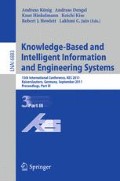Abstract
Question and answering sites have a lot of meaningless dialogues which are different from the intention of questioners, because many speakers speak in the same site at the same time. We tried to extract an egocentrism of the human from speeches of question and answering sites and showed the mutual understanding gap based on the method to solve this issue. In this paper, we propose the method to extract the mutual understanding gap in short dialogues such as two or less speeches that is not focused so far. As a result, the mutual understanding gap in wide-ranging dialogue data can be detected, and it is extensible to a further applications.
Access this chapter
Tax calculation will be finalised at checkout
Purchases are for personal use only
Preview
Unable to display preview. Download preview PDF.
References
Anne, K., Steve, P.: Natural Language Processing and Text Mining. Springer, Heidelberg (2006)
Kitaoka, N., Takeuchi, M., Nishimura, R., Nakagawa, S.: Response Timing Detection Using Prosodic and Linguistic Information for Human-friendly Spoken Dialog Systems. Journal of JSAI 20(3) SP-E, 220–228 (2005)
Adamic, L., Adar, E.: Friends and neighbors on the web. Social Networks 25(3), 211–230 (2003)
Suzuki, N., Tsuda, K.: Egocentrism Presumption Method with N-Gram for e-Business. In: Lovrek, I., Howlett, R.J., Jain, L.C. (eds.) KES 2008, Part II. LNCS (LNAI), vol. 5178, pp. 1002–1009. Springer, Heidelberg (2008)
Suzuki, N., Tsuda, K.: An effective extraction method for the gap of the mutual understanding based on the egocentrism in business communications. In: Velásquez, J.D., Ríos, S.A., Howlett, R.J., Jain, L.C. (eds.) KES 2009. Lecture Notes in Computer Science (LNAI), vol. 5712. Springer, Heidelberg (2009)
Matsumoto, H.: A morpheme analysis system ”ChaSen”. Information Processing 41(11) (2000)
Author information
Authors and Affiliations
Editor information
Editors and Affiliations
Rights and permissions
Copyright information
© 2011 Springer-Verlag Berlin Heidelberg
About this paper
Cite this paper
Suzuki, N., Fujita, Y., Tsuda, K. (2011). Extraction Method of the Mutual Understanding Gap Based on Egocentrism in Short Dialogues. In: König, A., Dengel, A., Hinkelmann, K., Kise, K., Howlett, R.J., Jain, L.C. (eds) Knowledge-Based and Intelligent Information and Engineering Systems. KES 2011. Lecture Notes in Computer Science(), vol 6883. Springer, Berlin, Heidelberg. https://doi.org/10.1007/978-3-642-23854-3_40
Download citation
DOI: https://doi.org/10.1007/978-3-642-23854-3_40
Publisher Name: Springer, Berlin, Heidelberg
Print ISBN: 978-3-642-23853-6
Online ISBN: 978-3-642-23854-3
eBook Packages: Computer ScienceComputer Science (R0)

